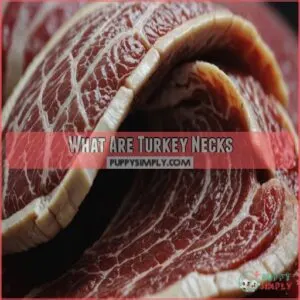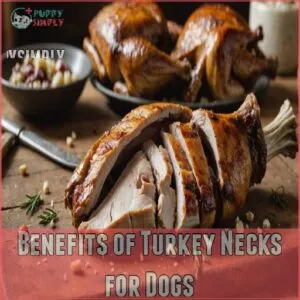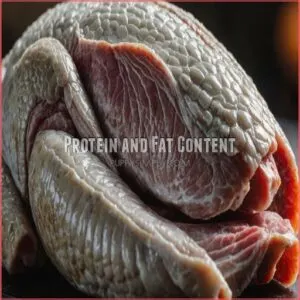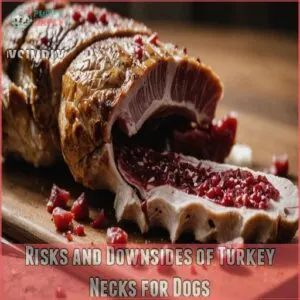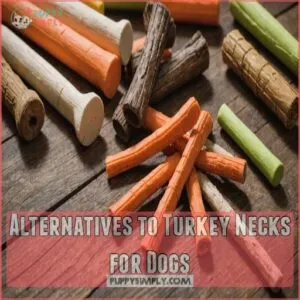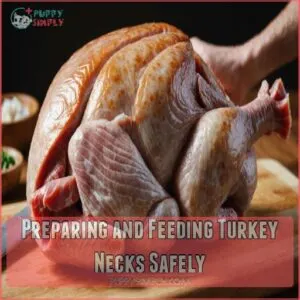This site is supported by our readers. We may earn a commission, at no cost to you, if you purchase through links.
 Yes, dogs can eat turkey necks, but there’s more to the story than a simple "bon appétit!"
Yes, dogs can eat turkey necks, but there’s more to the story than a simple "bon appétit!"
Raw or dehydrated turkey necks offer a buffet of benefits for your furry friend, including high-quality protein, glucosamine, chondroitin, and essential minerals.
They’re like nature’s toothbrush, helping to keep your dog’s pearly whites clean.
However, it’s not all gravy – there are risks to think about.
Bacterial contamination and choking hazards are real concerns, so you’ll need to be a vigilant sous chef.
Proper preparation and supervision are key to ensuring your pup’s turkey neck feast doesn’t ruffle any feathers.
Stick around to uncover the juicy details on serving sizes and safety tips.
Table Of Contents
- Key Takeaways
- What Are Turkey Necks
- Benefits of Turkey Necks for Dogs
- Nutritional Information for Turkey Necks
- Risks and Downsides of Turkey Necks for Dogs
- Alternatives to Turkey Necks for Dogs
- Preparing and Feeding Turkey Necks Safely
- Safety Precautions and Considerations
- Frequently Asked Questions (FAQs)
- Are turkey necks safe for dogs?
- Can dogs eat turkey neck bones?
- What happens if a dog eats a turkey neck?
- Can a dog eat raw turkey necks?
- Can dogs eat turkey necks on Thanksgiving?
- Can dogs eat frozen turkey necks?
- Can dogs eat cooked turkey neck?
- What part of turkey can dogs not eat?
- Can dogs get salmonella from raw turkey neck?
- Can dogs eat neck bone meat?
- How often can dogs eat turkey necks?
- Can turkey necks replace regular dog food?
- Are turkey necks suitable for all dog breeds?
- Do turkey necks help with bad dog breath?
- Can dogs with pancreatitis eat turkey necks?
- Conclusion
Key Takeaways
- You can feed your dog turkey necks, but they come with both benefits and risks. They’re high in protein and support dental health, but can pose choking hazards and bacterial contamination.
- You’ll want to choose raw or dehydrated turkey necks over cooked ones. Cooking makes the bones brittle and dangerous, while raw or dehydrated options maintain their natural texture and nutrients.
- You shouldn’t use turkey necks as a replacement for regular dog food. They’re best served as occasional treats, no more than once or twice a week, to complement a balanced diet.
- You need to consider your dog’s individual needs before introducing turkey necks. Factors like age, size, health condition, and breed play crucial roles in determining if they’re suitable for your pet.
What Are Turkey Necks
Turkey necks are the entire neck portion of a turkey, including the spine, trachea, muscle, and connective tissue, but without the head, skin, or crop.
You’ll find them available in two main forms for dogs: dehydrated and raw.
Turkey necks are sourced from butchers, supermarkets, or specialized pet food retailers.
Definition and Composition
You’ve probably seen turkey necks in the pet store, but what exactly are they?
Turkey necks are the entire neck of the turkey, minus the head, skin, and crop.
These by-products of the poultry industry pack a punch nutritionally.
They’re composed of spine, trachea, muscle, and connective tissue, measuring up to 10-12 inches long.
While not meant for humans, they’re a treasure trove of nutrients for our canine companions.
Types of Turkey Necks
Now that we’ve covered the basics of turkey necks, let’s explore the different types available for your furry friend.
Turkey necks come in various forms, each with its own unique characteristics:
- Dehydrated: Imagine a chewy, jerky-like treat that’ll keep your pup occupied for hours
- Raw: Picture a fresh, meaty neck straight from the butcher’s counter
- Frozen: Think of a cool, soothing chew perfect for hot summer days
- Smoked: Envision a flavorful, aromatic treat that’ll have your dog drooling
Each type offers different benefits and potential risks, so choose wisely based on your dog’s needs and preferences.
Sources of Turkey Necks
Three primary sources offer turkey necks for your canine companion.
Supermarket chains and butcher shops provide raw turkey necks, perfect for dogs craving a natural chew.
Pet stores stock dehydrated options, balancing convenience with nutritional benefits.
For the farm-fresh experience, local farms offer ethically sourced necks.
Remember, cooked turkey necks pose a dog choking hazard, so stick to raw or dehydrated options to avoid potential dog food poisoning or intestinal blockage.
| Source | Product Type | Safety Considerations |
|---|---|---|
| Supermarkets | Raw | Bacterial contamination |
| Pet Stores | Dehydrated | Potential choking risk |
| Local Farms | Fresh, Raw | Ethical sourcing, handling |
Benefits of Turkey Necks for Dogs
Turkey necks offer multiple benefits for your canine companion, including improved dental health, mental stimulation, and joint support.
These nutrient-rich treats provide essential proteins and compounds that contribute to your dog’s overall well-being, making them a valuable addition to a balanced diet.
Dental Health Benefits
Turkey necks aren’t just a tasty treat; they’re nature’s toothbrush for your furry friend.
As your dog gnaws on these chewy morsels, they’re actually giving their teeth a workout.
The tough texture acts like dental floss, scraping away plaque and tartar.
This natural chewing action promotes gum health and can even freshen your pup’s breath.
It’s like hitting the dental jackpot for your canine companion!
Mental Enrichment and Stress Relief
Chew-happy pooches rejoice! Turkey necks aren’t just tasty treats; they’re boredom busters too.
These natural chew toys keep your furry friend engaged for up to 30 minutes, providing much-needed mental stimulation.
As your dog gnaws away, they’re not just satisfying their chewing instinct but also relieving stress and anxiety.
It’s like a puzzle feeder and chew toy rolled into one, offering a double dose of canine enrichment.
Joint Health and Mobility
Beyond mental benefits, turkey necks pack a punch for your pup’s joint health.
They’re loaded with glucosamine and chondroitin, nature’s mobility supplements.
Here’s how these treats can keep your furry friend sprightly:
- Ease arthritis pain
- Improve flexibility in aging dogs
- Support cartilage health
Think of turkey necks as edible yoga for your dog’s joints.
They’re not just treats; they’re tasty tools to keep your four-legged friend moving like a pup well into their golden years.
Nutritional Value
Now, let’s talk turkey about nutrition.
These necks pack a powerful protein punch, essential for your pup’s muscle health.
They’re also rich in vitamins and minerals, supporting overall dog health.
But watch that fat percentage – too much can lead to dog obesity or pancreatitis.
Keep an eye on the calorie count; it’s all about balance in your furry friend’s diet.
Remember, moderation is key for good puppy nutrition.
Nutritional Information for Turkey Necks
Turkey necks are a nutrient-dense treat for dogs, packed with protein, healthy fats, and essential vitamins and minerals.
Understanding their nutritional profile is key for determining appropriate serving sizes and ensuring they complement your dog’s diet effectively.
Protein and Fat Content
Turkey necks pack a powerful protein punch for your pup.
They’re a lean protein source with a balanced fat-to-protein ratio, making them an excellent addition to your dog’s diet.
Here’s what you need to know about turkey neck nutrition:
- High-quality protein supports muscle development and repair
- Moderate fat content provides energy without excessive calories
- Ideal for weight management and active dogs
- Natural source of essential amino acids
- Helps maintain healthy skin and coat
When feeding your dog raw turkey necks, it’s essential to handle them safely to avoid bacterial contamination risks. Remember, moderation is key when incorporating turkey necks into your dog’s meal plan.
Vitamins, Minerals, and Compounds
While protein and fat are key players, turkey necks also pack a punch with vitamins and minerals.
These nutritional powerhouses contribute to your dog’s overall health and wellness.
Let’s break down the composition of these canine superfoods:
| Nutrient | Health Benefit |
|---|---|
| Calcium | Bone strength |
| Phosphorus | Energy metabolism |
| Iron | Oxygen transport |
| Zinc | Immune function |
| B-vitamins | Cellular health |
You’re not just giving your pup a tasty treat; you’re serving up a natural supplement for their well-being.
Caloric Intake and Feeding Guide
Let’s talk turkey about calories.
For those interested in learning more about products related to turkey neck calories, you can find various options through online stores like those found on turkey neck products.
A typical turkey neck packs about 100-150 calories, so you’ll want to factor that into your pup’s daily intake.
For a 50-pound dog, one turkey neck could make up 10-15% of their daily calorie needs.
Remember, treats shouldn’t exceed 10% of your dog’s daily calories.
Adjust portion sizes based on your dog’s weight, age, and activity level to keep them fit as a fiddle.
Risks and Downsides of Turkey Necks for Dogs
While turkey necks can offer benefits, they also pose potential risks to your dog’s health.
These include bacterial contamination, choking hazards, digestive blockages, and allergic reactions, all of which require careful consideration before feeding.
Bacterial Contamination and Food Safety
Beware, dog lovers! Raw turkey necks can be a bacterial playground. These treats pose a real threat of Salmonella and E. coli contamination, putting your furry friend at risk.
To keep tails wagging safely, practice proper food handling. Opt for dehydrated turkey necks, which undergo a process that zaps those pesky pathogens.
Remember, in terms of your pup’s health, it’s better to be safe than sorry. Always consult your vet for personalized advice.
Choking Hazards and Digestive Blockages
Bacteria aren’t the only concern with turkey necks.
These treats can pose serious choking hazards, especially for smaller dogs or enthusiastic eaters.
The size of turkey necks can be a real mouthful, and bone fragments might get stuck in your pup’s throat.
If your dog does experience choking, it’s important to know how to react and have the right tools, such as those found in turkey neck choking solutions.
Even if they make it past the gullet, poorly digested pieces can cause constipation or, worse, digestive blockages.
It’s like a traffic jam in your dog’s belly – not fun for anyone!
Allergic Reactions and Intolerances
Considering your dog’s health, turkey necks mightn’t be a treat for every pup.
Some dogs can develop allergies or intolerances to poultry, leading to itchy skin, upset stomachs, or even more serious reactions, which is why hypoallergenic dog food can be a great alternative to manage these issues.
Keep an eye out for signs like excessive scratching, vomiting, or diarrhea after eating turkey necks.
If you notice these symptoms, it’s best to consult your vet and explore alternative treats that won’t ruffle your furry friend’s feathers.
Alternatives to Turkey Necks for Dogs
If you’re looking for safer alternatives to turkey necks, considering the risks of Choking Hazards and Intestinal Blockage, you’ve got options.
From chicken necks for small breeds to dental chews and bully sticks, there are many choices that can provide similar benefits without the risks associated with turkey necks.
Chicken Necks and Other Poultry Options
While turkey necks pose risks, chicken necks offer a smaller alternative for your pup.
They’re easier to chew and less likely to cause choking.
Duck necks are another tasty option, packing a nutritional punch.
Remember, size matters – match the neck to your dog’s breed.
Always serve raw or dehydrated, never cooked.
These poultry treats can clean teeth and provide mental stimulation, but moderation is key to avoid tummy troubles.
Dental Chews and Rawhide Alternatives
Looking for safer alternatives to turkey necks? Dental chews and rawhide-free options are your best bet.
These goodies keep your pup’s chompers clean but also satisfy their urge to gnaw.
Opt for VOHC-approved dental chews or try rawhide alternatives like sweet potato chews or pumpkin-based treats.
They’re easier on the tummy and less likely to cause blockages.
Always supervise chew time and choose size-appropriate treats for your furry friend.
Bully Sticks and Natural Chews
Bully sticks and natural chews offer a safer alternative to turkey necks.
These long-lasting treats satisfy your dog’s chewing instinct while promoting dental health.
Unlike rawhide, bully sticks are highly digestible and less likely to cause blockages, especially when compared to raw turkey necks that can harbor harmful bacteria like Salmonella.
When choosing, opt for reputable brands to minimize bacterial contamination risks.
Monitor your pup’s chewing habits, especially for puppies or dogs prone to gastrointestinal issues.
Always consult your vet for personalized advice on chew safety.
Preparing and Feeding Turkey Necks Safely
You’ll need to handle turkey necks with care to make sure your dog’s safety when feeding them this treat.
Proper preparation, storage, and supervision are essential to minimize risks and maximize the benefits of turkey necks for your canine companion.
Raw Vs. Cooked Turkey Necks
Raw turkey necks are the safer choice for your furry friend.
Cooking changes the bone structure, making them brittle and dangerous.
Raw necks maintain their natural texture, promoting dental health and providing a satisfying chew.
They’re more digestible and preserve essential nutrients.
However, raw meat carries bacterial risks, so proper handling is essential.
Always supervise your dog and consider their individual health needs when introducing turkey necks to their diet.
Handling and Storage Precautions
Out of the freezer and into the fridge, that’s the golden rule for thawing turkey necks safely.
Keep ’em chilled until it’s chow time to keep bacteria at bay.
Wash your hands and surfaces thoroughly—sanitation is key in this doggy delicacy dance.
For leftovers, refrigerate promptly and use within 24 hours.
Remember, for raw treats, your freezer’s your best friend for long-term storage.
Supervising and Monitoring Your Dog
Keep an eye on your pup while they chow down on turkey necks.
Monitor their chewing habits closely to prevent choking risks.
Remove any leftover bits promptly for proper waste disposal.
Make sure fresh water is always accessible, and limit feeding frequency to avoid overindulgence.
If your dog gulps food, try hand-feeding or freezing the neck to slow them down.
Remember, supervision is key to safe turkey neck enjoyment!
Safety Precautions and Considerations
Safety should be your top priority when feeding turkey necks to your dog.
Consider your dog’s age, health, and individual needs.
Make sure you’re sourcing high-quality turkey necks.
Always consult with your veterinarian for personalized advice before introducing this treat to your pet’s diet.
Age and Health Restrictions for Turkey Necks
Turkey necks aren’t a one-size-fits-all treat.
Puppies and seniors should steer clear due to their delicate digestive systems.
If you’re still unsure about what type of turkey neck is suitable for your dog, consider checking out Turkey Neck Treats.
If your furry friend has dental issues, these chewy treats might be a pain in the neck – literally!
Dogs with GI problems or a weak immune system should also pass.
It’s like picking the right dance partner; you’ve got to match the treat to your dog’s abilities.
Ensuring Safe Sourcing and Quality
When it comes to sourcing turkey necks for your furry friend, quality is key.
You’ll want to sniff out reputable suppliers who prioritize farm sourcing and ethical treatment, and also make sure the meat hasn’t gone past its safe storage time to avoid food poisoning risks.
Here’s what to keep an eye on:
- Look for clear ingredient labeling
- Check for stringent inspection standards
- Assess the supplier’s contamination risk management
- Prioritize farms with transparent ethical practices
Don’t let your pup’s treat turn into a trick – smart sourcing keeps tails wagging safely!
Consulting a Veterinarian for Personalized Advice
Your dog’s health is as unique as their pawprint.
While you’ve got the scoop on sourcing quality turkey necks, it’s time to bring in the big guns – your vet.
They’ll consider your pup’s breed, allergies, and specific needs to craft a feeding guide that’s just right for them.
Think of your vet as your dog’s personal chef, ensuring every bite is suited for their best health.
Frequently Asked Questions (FAQs)
Are turkey necks safe for dogs?
Raw turkey necks, rich in bone health benefits, can provide essential nutrients for canines. Like a double-edged sword, turkey necks offer benefits and risks for dogs.
They’re protein-rich and great for dental health, but they can pose choking hazards and carry bacteria.
You’ll need to weigh the pros and cons carefully.
Can dogs eat turkey neck bones?
Dogs can eat raw turkey necks as a nutritious weekly treat, packed with protein, calcium, and glucosamine for joint health and natural teeth cleaning as stated in the Safe Turkey Neck Treats Guide. Dogs can eat raw or dehydrated turkey neck bones, but there are risks.
They provide dental benefits and nutrients, but can pose choking hazards or cause digestive issues.
Always supervise and consult your vet before introducing them to your pup’s diet.
What happens if a dog eats a turkey neck?
Imagine Max, a curious Labrador, snatching a turkey neck.
He’ll likely enjoy chewing it, but risks include choking, bacterial infection, or digestive issues.
You’ll need to monitor for vomiting, lethargy, or unusual behavior.
When in doubt, call your vet.
Can a dog eat raw turkey necks?
Yes, dogs can eat turkey necks, which provide high-quality protein, trace minerals, and essential vitamins, including benefits for joint health and dental hygiene, but with caution.
They’re packed with nutrients and can help clean teeth.
However, always supervise, as they pose choking and bacterial risks.
Consult your vet before adding them to your pup’s diet.
Can dogs eat turkey necks on Thanksgiving?
As tempting as it’s to share the holiday feast, turkey necks are a risky treat for your furry friend on Thanksgiving.
They can pose choking hazards and may contain harmful bacteria.
Stick to dog-safe alternatives for a worry-free celebration.
Can dogs eat frozen turkey necks?
Frozen turkey necks can be a safe, chewy treat for your dog.
They’re great for dental health and provide mental stimulation.
However, always supervise your pup while they’re enjoying one, and thaw slightly to prevent potential tooth damage.
Can dogs eat cooked turkey neck?
Imagine a bone becoming a dangerous weapon.
That’s what happens when you cook turkey necks for your dog.
You’ll turn a potential treat into a hazard.
However, it’s essential to avoid giving your dog cooked turkey necks, as they can splinter and cause intestinal damage from rib bones. Stick to raw or dehydrated turkey necks instead to keep your furry friend safe and happy.
What part of turkey can dogs not eat?
Keep your furry friend safe by avoiding turkey skin, fat, and bones.
These can cause pancreatitis, choking, or intestinal damage.
Also, steer clear of onions, garlic, and seasoning in stuffing, which are toxic to dogs.
Can dogs get salmonella from raw turkey neck?
Yes, dogs can get salmonella from raw turkey necks.
These treats carry the risk of bacterial contamination, including salmonella and E.coli.
To minimize risks, consider alternatives like dental chews or consult your vet for safer options.
Can dogs eat neck bone meat?
Chew on this: Dogs can eat neck bone meat, but it’s not a walk in the park.
While it’s protein-packed, you’ll need to be vigilant.
Serve it raw or dehydrated, supervise closely, and consider your pup’s size and health.
How often can dogs eat turkey necks?
You’ll want to limit turkey neck treats to once or twice a week for your pup.
They’re packed with nutrients, but moderation’s key.
Consider your dog’s size, health, and diet when deciding frequency.
Always supervise and consult your vet.
Can turkey necks replace regular dog food?
Turkey necks can’t replace your pup’s balanced diet.
While they’re a tasty treat, they lack essential nutrients.
Stick to regular dog food for meals, and use turkey necks as an occasional reward.
Your dog’s health comes first!
Are turkey necks suitable for all dog breeds?
Turkey necks aren’t one-size-fits-all for dogs.
Consider your pup’s size, age, and health.
They’re better suited for larger breeds and adult dogs with strong teeth.
Always supervise and consult your vet before introducing new treats.
Do turkey necks help with bad dog breath?
Chewing on turkey necks can help freshen your dog’s breath.
The mechanical action of gnawing removes plaque and tartar, while the natural enzymes in raw meat aid in oral health.
However, they’re not a cure-all for bad breath.
Can dogs with pancreatitis eat turkey necks?
Like playing with fire, feeding turkey necks to dogs with pancreatitis isn’t recommended.
You’ll want to steer clear of high-fat treats.
Instead, stick to your vet’s advised diet to keep your furry friend’s pancreas happy and healthy.
Conclusion
While some may worry about giving their dogs turkey necks, they can be a safe and nutritious treat when handled properly.
Remember, not all dogs can eat turkey necks, so consult your vet first.
If you decide to offer them, choose high-quality sources, supervise your pup, and follow proper preparation guidelines.
With these precautions, turkey necks can provide dental benefits, mental stimulation, and nutritional value.
Just like any new food, introduce them gradually and monitor your dog’s response.
Your furry friend might just gobble up this tasty, natural chew!

